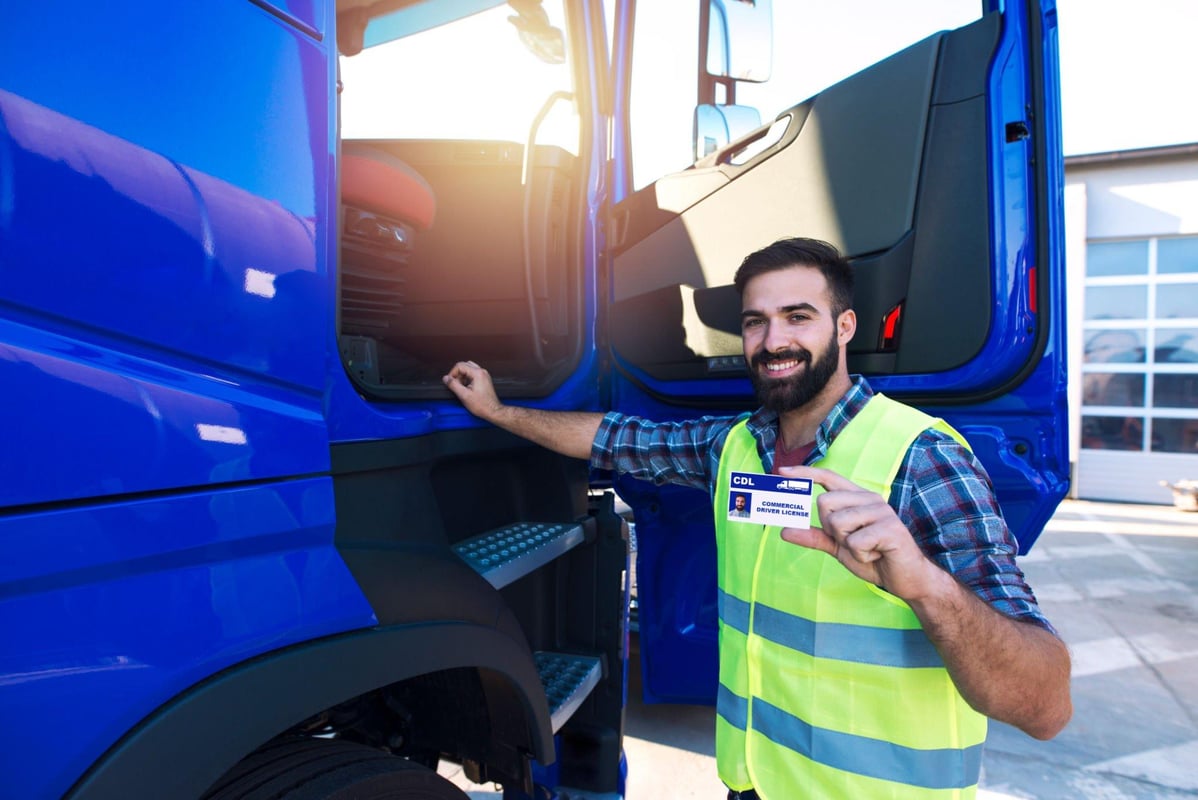CDL-B classes near me in Charlotte
In the Charlotte metro area, the average cost of a CDL-B class is $3750 and the average class length is approximately 3 weeks long
Trade and industry classes near
Charlotte, NC 28202Online classes
Financial aid

Laurel Institute of Technology
Electrical Systems Technician
- Earn a certificate in just 20 months.
- Gain essential skills to install and maintain electrical/electronic systems

Liberty University Online
BS: Civil Engineering
- Online, completion in as little as 48 months.
- Option to transfer credits for up to 75% of the entire degree.

Southern New Hampshire University
BS Operations Management with concentration in Logistics and Transportation
- Complete your degree at your own pace
- 24/7 online accessibility
Programs not available on Dreambound
H&R Elite Trucking Academy
Class B
- Learn to operate vehicles over 26,000 pounds
- Hands-on training with a combination of classroom and driving experience
$3,600 total
CDL College
Air Brakes Endorsement
- Free CDL Permit Classes
- Online ELDT CDL Courses
No cost info
Center for Employment Education
Online Commercial Driver's License Class B (CDL-B) Classes
No cost info
South Piedmont Community College - Old Charlotte Highway
In person Commercial Driver's License Class B (CDL-B) Classes
The Truck Driver Training program prepares individuals to drive tractor trailer rigs. This course teaches proper driving procedures, safe driver responsibility, commercial motor vehicle laws and regulations, and the basic principles and practices for operating commercial vehicles. The course work includes motor vehicle laws and regulations, map reading, vehicle maintenance, safety procedures, daily logs, defensive driving, freight handling, security, and fire protection. Highway driving training exercises and classroom lectures are used to develop the student’s knowledge and skills. Upon successful completion, students are qualified to take the Commercial Driver’s License exam and are employable by commercial trucking firms. They may also become owner-operators and work as private contract haulers.
Benefits of the South Piedmont Truck Driver Training program:
Classes provide students with the option to focus on either a CDLA or CDLB license.
Day and evening/weekend schedule options meet the needs of working adults.
Course tuition includes study materials.
Students who successfully complete the course will work with instructors to schedule a DMV testing appointment.
SPCC’s tuition rate is very affordable when compared with other truck driving schools in the area.
Students may have an earned CDL license and be working by Christmas.
$1,101.40 total
CDL-B Classes Near Me in Charlotte
Introduction
The commercial driving industry is a thriving field, offering numerous opportunities for individuals looking for a stable and rewarding career. For those residing in Charlotte, North Carolina, obtaining a Commercial Driver's License Class B (CDL-B) can be a stepping stone towards a fulfilling career in this industry. This blog post is designed to provide you with the necessary information about CDL-B classes in Charlotte.

What is a CDL-B
A CDL-B is a type of commercial driver's license that permits the holder to operate heavy, but smaller, vehicles like buses, dump trucks, or delivery vans. Unlike a CDL-A, which is for driving any combination of vehicles with a gross vehicle weight rating (GVWR) of 26,001 pounds or more, a CDL-B is restricted to vehicles not hitched to a trailer that exceeds 10,000 pounds GVWR.
Training Requirements
Complying with the training requirements is a critical step towards obtaining a CDL-B. As mandated by the Federal Motor Carrier Safety Administration (FMCSA), prospective drivers must complete a driver training course from a registered training provider. This course typically covers:
-
Basic vehicle control and operation
-
Safe driving techniques
-
Road signs and traffic laws
-
Emergency procedures
What to Look for in a Class
When searching for a CDL-B class in Charlotte, consider the following:
-
Certification and Approval: The training provider should be certified by the state's Department of Motor Vehicles (DMV) and approved by the Professional Truck Driver Institute (PTDI) or other recognized bodies.
-
Course Content: The course should cover both theoretical knowledge and practical skills necessary for the CDL-B examination.
-
Instructors' Expertise: The instructors should be experienced commercial drivers with adequate teaching experience.
-
Class Size: Smaller class sizes can provide more personalized training and better learning outcomes.
What to Expect from the Day-to-Day Class
During the course, students will typically spend their time between classroom instruction and hands-on training. The theoretical part usually covers traffic laws, vehicle operation, and safety protocols, while the practical part involves actual driving, vehicle inspection, and handling emergency situations.
The Certification Process
The CDL-B certification process involves passing a written knowledge test and a skills test. The written test covers topics like traffic laws, safety regulations, and vehicle operation, while the skills test assesses the applicant's ability to operate a CDL-B vehicle safely. Successful completion of these tests earns the applicant a CDL-B license.
How to Find Related Jobs
After obtaining a CDL-B, numerous job opportunities become available in various sectors like transportation, waste management, construction, and delivery services. Job search platforms, networking, and company websites are effective ways to find relevant job openings.
What Other Classes Someone Can Take After Becoming a CDL-B
After obtaining a CDL-B, you can further enhance your profile by taking additional classes or endorsements. Some of these include:
-
School Bus Endorsement: This endorsement allows you to drive a school bus.
-
Passenger Endorsement: This endorsement permits you to transport passengers.
-
Tank Vehicle Endorsement: This endorsement qualifies you to drive a tank vehicle.
Additional Opportunities
Obtaining a CDL-B license opens up a world of opportunities not limited to driving. Here are other career paths you might consider:
-
Transportation Manager: This role involves overseeing the transportation department of a company.
-
Dispatchers: Dispatchers coordinate and manage the schedules of drivers.
-
Driver Trainer: As a driver trainer, you can train new drivers or provide refresher courses to experienced drivers.
Other Vocational Training Programs
If you are interested in exploring other vocational training programs after getting your CDL-B license, there are several options available. You can consider becoming a HVAC technician, pharmacy technician, or medical sonographer in North Carolina.
Importance of Continuing Education
Continuing education is critical in maintaining your CDL-B license. This can be through refresher courses or obtaining additional endorsements. This not only enhances your skills but also makes you more competitive in the job market.
Final Thoughts
Embarking on a journey to obtain a CDL-B license in Charlotte is a commendable decision. It not only opens up a wide range of job opportunities but also paves the way for career advancement through continuing education and additional endorsements. Remember, the key to a successful career in commercial driving lies in obtaining quality training, constant practice, and commitment to safety.
Navigate the certification journey in this field with Dreambound's detailed guides, each crafted for various cities. For a deeper understanding of the process in other states, our additional guides may be able to help.
- How to Become a School Bus Driver in District of Columbia
- How to Become a School Bus Driver in Illinois
- How to Become a School Bus Driver in Mississippi
- How to Become a School Bus Driver in Ohio
- How to Become a School Bus Driver in Tennessee
Exploring a variety of professional opportunities? Dreambound has many extensive guides to help you make informed decisions. Check out these guides:
FAQ
What is Dreambound?
Dreambound's platform has the largest number of options for students to find career & technical education. While we can't guarantee any career outcomes, our mission is to provide you with the information you need to find a program that helps you start your new career journey.
What programs do you offer?
Dreambound has over 70 programs across healthcare, technology, business, and industrial trades. This includes programs such as Medical Billing, Cybersecurity, and welding.
Do you offer financial aid?
Some of our schools offer financial aid for those who qualify. Many others offer payment plans, where you can pay the cost of class over time.
Is it possible to do online classes?
Yes, Dreambound offers many online programs. On Dreambound's search, you can filter by online, in-person, and hybrid (part online, part in-person).